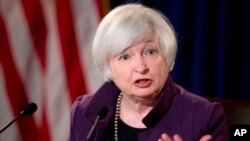U.S. central bank officials concluded a two-day policy meeting on Wednesday saying the U.S. economy continues to expand at a moderate pace despite a slowdown in the energy sector and economic difficulties in other countries.
The Fed noted recent job gains have been solid and projected continued improvement in labor market conditions in coming months.
But absent from the Fed statement was the likelihood of a possible interest rate hike. Most economists believe the Fed will start raising rates by September, but some say central bank officials may have painted themselves into a corner by not signaling their intentions more clearly.
Bankrate.com senior analyst Greg McBride told VOA if economic indicators improve over the next seven weeks as some expect, the Fed could "have a difficult time raising rates in September, given today's statement."
That's because financial markets don't react well to surprises, said McBride. He believes a rate hike is still possible in September, but he said the odds are not as good following Wednesday's statement.
Global stocks and the dollar climbed higher after the Fed left rates unchanged. Lower interest rates help stimulate economic growth by reducing the cost of borrowing and boosting business and consumer spending.
One drawback is that cheap money can raise the inflation rate, which currently remains well below the Fed's target rate of 2 percent. Interest rates have remained near zero since December 2008.





